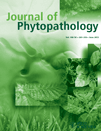
JOURNAL OF PHYTOPATHOLOGY
Scope & Guideline
Driving forward the science of plant-pathogen interactions.
Introduction
Aims and Scopes
- Plant Pathogen Identification and Characterization:
The journal emphasizes the identification and molecular characterization of various plant pathogens, including fungi, bacteria, viruses, and nematodes, providing insights into their biology and pathogenic mechanisms. - Disease Resistance and Management Strategies:
Research articles often address the development of resistant plant varieties and the implementation of effective management strategies against plant diseases, including chemical, biological, and cultural practices. - Epidemiology and Disease Modeling:
The journal includes studies on the epidemiology of plant diseases, utilizing modeling approaches to predict disease outbreaks and impacts on crop yield, which is critical for effective management. - Impact of Environmental Factors on Plant Health:
Research exploring how environmental conditions affect the incidence and severity of plant diseases is a key focus, highlighting the interplay between climate change and plant pathology. - Biocontrol and Sustainable Practices:
A significant portion of the journal's articles discuss biocontrol agents and sustainable agricultural practices aimed at reducing chemical inputs while effectively managing plant diseases.
Trending and Emerging
- Molecular and Genomic Studies of Pathogens:
There is a growing emphasis on molecular and genomic approaches to understand plant pathogens, including whole-genome sequencing and transcriptomic studies, which provide deeper insights into pathogenicity and resistance mechanisms. - Integrated Disease Management Approaches:
Research focusing on integrated disease management strategies that combine biological, chemical, and cultural practices is increasingly prominent, reflecting a shift towards sustainable agriculture. - Climate Change Impact on Plant Diseases:
The journal is seeing an increase in studies investigating the effects of climate change on plant disease dynamics, which is crucial for developing adaptive management strategies. - Plant-Microbe Interactions:
Emerging research explores complex interactions between plants and their associated microbial communities, including endophytes and rhizobacteria, which can influence disease resistance and overall plant health. - Technological Advances in Disease Detection:
Innovations in detection technologies, including remote sensing and molecular diagnostics, are increasingly featured, highlighting the importance of timely and accurate disease detection in crop management.
Declining or Waning
- Traditional Chemical Control Methods:
There is a noticeable decline in research focused solely on conventional chemical control methods for managing plant diseases, as the emphasis shifts towards integrated pest management and sustainable practices. - Basic Morphological Studies:
Research articles that primarily focus on basic morphological descriptions of pathogens without molecular or genetic analysis have decreased, indicating a trend towards more sophisticated and detailed studies. - Single Pathogen Studies:
The journal has seen a reduction in publications centered on single pathogen studies, with a growing preference for research that investigates multiple pathogens or complex disease interactions. - Invasive Species Research:
Research on invasive plant pathogens appears less frequent, possibly due to a shift in focus towards more impactful and economically relevant plant diseases. - Historical and Archeological Studies of Plant Diseases:
There is a waning interest in historical studies of plant diseases, which may be overshadowed by the urgency of contemporary issues related to crop production and food security.
Similar Journals
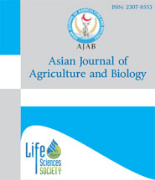
Asian Journal of Agriculture and Biology
Connecting scholars to cultivate agricultural advancements and biological insights.Welcome to the Asian Journal of Agriculture and Biology, a premier open access journal published by LIFE SCIENCES SOC PAKISTAN, dedicated to advancing research in the fields of agricultural and biological sciences. Since its inception in 2013, this journal has provided a vital platform for scholars and practitioners to disseminate novel findings and innovative methodologies that contribute to the betterment of agricultural practices and biological research. With an impressive H-Index and ranked in the Q3 category across multiple disciplines including Agricultural and Biological Sciences, Biochemistry, Genetics, and Molecular Biology, as well as Medicine, the journal showcases high-quality research that influences both academic and practical applications globally. The journal is indexed in Scopus, reinforcing its commitment to high academic standards and providing researchers with efficient access to significant knowledge. Based in Pakistan, the Asian Journal of Agriculture and Biology is your gateway to staying abreast of the latest trends and discoveries that support sustainable development and health sciences.
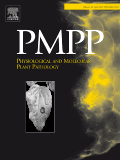
PHYSIOLOGICAL AND MOLECULAR PLANT PATHOLOGY
Bridging molecular insights with physiological understanding.Physiological and Molecular Plant Pathology is a leading journal published by Academic Press Ltd - Elsevier Science Ltd, dedicated to advancing our understanding of plant diseases through the synthesis of physiological and molecular perspectives. With an ISSN of 0885-5765, this esteemed journal has been a cornerstone in the field since its inception in 1986 and continues to publish critical research findings up to 2024. Notably, it holds a strong reputation in Plant Science, ranked Q2, and genetics, ranked Q3, reflecting its impactful contributions to these important areas of study. The journal is recognized within Scopus, achieving a ranking of 151 out of 516 in Plant Science, positioning it within the 70th percentile, making it a vital resource for researchers and students alike. While it is not an open-access journal, the insights provided in each issue are invaluable for those dedicated to understanding the complexities of plant pathology and enhancing agricultural resilience. Researchers, professionals, and students in the field are encouraged to explore and contribute to this pivotal journal, which plays a crucial role in driving innovation and discovery in plant health sciences.
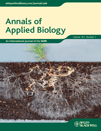
ANNALS OF APPLIED BIOLOGY
Innovating crop solutions through rigorous research.Annals of Applied Biology, published by Wiley, stands as a pivotal resource in the fields of Agronomy and Crop Science, boasting an impressive impact factor that reflects its significance and influence in the academic community. With a storied history dating back to 1914, this journal serves as a comprehensive platform for innovative research and applied studies in agricultural biology, specifically aimed at improving crop production and sustainable practices. Currently categorized in the Q1 quartile for Agronomy and Crop Science in 2023, it ranks an admirable 82 out of 406 in the Scopus database, placing it within the top 79th percentile of its category. Researchers, professionals, and students worldwide rely on the Annals of Applied Biology for cutting-edge insights and advancements in applied biological research, making it a vital component of the scientific discourse aimed at addressing pressing agricultural challenges. Please note that this journal does not offer open access options, thus ensuring a rigorous peer review process and the integrity of published work.
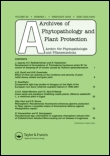
ARCHIVES OF PHYTOPATHOLOGY AND PLANT PROTECTION
Advancing Agricultural Solutions through Rigorous ResearchArchives of Phytopathology and Plant Protection, published by Taylor & Francis Ltd, stands as a pivotal platform in the field of agronomy and crop science since its inception in 1974. With an ISSN of 0323-5408 and E-ISSN of 1477-2906, this journal is dedicated to publishing high-quality, peer-reviewed research that addresses contemporary challenges in plant pathology and protection. As a Q3 ranked journal in its category with Scopus Rank #210/406, it serves a vital role in disseminating practical solutions and innovative discoveries to enhance agricultural productivity and sustainability. The journal fosters a rich exchange of ideas among researchers, professionals, and students, empowering them to contribute to the advancement of the agronomy and biological sciences. Despite being traditionally subscription-based, the journal's commitment to comprehensive and rigorous research makes it an essential resource for anyone invested in the future of plant health and agricultural innovation.

Annual Review of Phytopathology
Illuminating trends in plant science and medicine.Annual Review of Phytopathology, published by ANNUAL REVIEWS, is an esteemed journal that has been at the forefront of the field since its inception in 1973. With a focus on both Plant Science and Medicine, the journal holds a prestigious Q1 ranking in both categories for 2023, reflecting its influence and significance in the academic community. The journal features comprehensive review articles that encapsulate significant advancements and emerging trends in phytopathology, providing valuable insights for researchers, professionals, and students alike. Its rigorous peer-review process ensures the highest quality of publication, making it essential for anyone seeking to stay informed on critical issues affecting plant health and related disciplines. With an impressive Scopus ranking of #10 out of 516 in Agricultural and Biological Sciences, Annual Review of Phytopathology remains a vital resource for the dissemination of cutting-edge knowledge, fostering innovation and collaboration within the field.
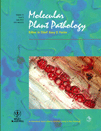
MOLECULAR PLANT PATHOLOGY
Exploring the molecular intricacies of plant pathology.MOLECULAR PLANT PATHOLOGY, published by Wiley, is a leading academic journal in the fields of Agronomy, Molecular Biology, Plant Science, and Soil Science, with a strong reputation underscored by its impressive Q1 rankings across multiple categories and a Scopus rank placing it in the top echelons of its fields. Since embracing Open Access in 2019, this journal has significantly broadened its reach, enhancing visibility and accessibility for researchers, professionals, and students alike. With a commitment to publishing high-quality, innovative research, MOLECULAR PLANT PATHOLOGY serves as a critical platform for advancing our understanding of plant diseases and pathogenesis, contributing to the development of sustainable agricultural practices. As a vital resource for scholarly communication, it fosters collaboration among scientists and supports the sharing of vital knowledge that addresses issues of global food security and environmental health.

JOURNAL OF GENERAL PLANT PATHOLOGY
Elevating Standards in Agronomy and Plant ScienceJOURNAL OF GENERAL PLANT PATHOLOGY, published by SPRINGER JAPAN KK, is a pivotal platform dedicated to the dissemination of high-quality research in the fields of agronomy and crop science, as well as plant pathology. With an ISSN of 1345-2630 and an E-ISSN of 1610-739X, this journal plays a significant role in advancing our understanding of plant diseases and their management, particularly within the context of sustainable agriculture. Currently ranking in the Q3 quartile for both Agronomy and Crop Science as well as Plant Science, it showcases a diverse array of articles that encompass fundamental research, innovative methodologies, and practical applications to address contemporary challenges in these fields. Researchers and professionals seeking to enhance their knowledge and stay abreast of the latest findings will find the JOURNAL OF GENERAL PLANT PATHOLOGY an invaluable resource. Operating without Open Access, it still ensures wide accessibility through institutional subscriptions and comprehensive digital archiving, with a commitment to excellence from its inception in 2001 through its ongoing developments into 2024.

Crop Journal
Advancing sustainable agriculture through innovative research.Crop Journal (ISSN: 2095-5421; E-ISSN: 2214-5141) is a premier, open access journal published by KEAI PUBLISHING LTD, dedicated to advancing the fields of agronomy and plant science. Established in 2013, this journal has quickly established itself as a vital resource for researchers, professionals, and students, achieving a remarkable Q1 ranking in both Agronomy and Crop Science, as well as Plant Science. With an impressive position in the Scopus rankings—30th out of 516 in Plant Science and 25th out of 406 in Agronomy—it stands at the forefront of scholarly discourse, representing the latest innovations and research breakthroughs within the global agricultural community. The journal embraces a broad scope that encompasses all aspects of crop science, aiming to foster understanding and propel advancements in sustainable agricultural practices. Accessible from anywhere in the world, Crop Journal plays a crucial role in disseminating knowledge that addresses the challenges of food security and environmental sustainability, making it an indispensable tool for those invested in the future of our planet's agriculture.
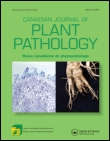
CANADIAN JOURNAL OF PLANT PATHOLOGY
Championing high-quality research in plant pathology since 1979.Canadian Journal of Plant Pathology, published by Taylor & Francis Inc, is a leading academic journal dedicated to advancing the field of plant pathology, with a significant focus on the interplay between plant health and environmental factors. Established in 1979, this journal has established a reputation for high-quality research, currently holding a commendable impact factor within its category. As of 2023, it ranks in the Q2 quartile for both Agronomy and Crop Science as well as Plant Science, highlighting its importance and influence in these domains. With an impressive ranking of 142/516 in Plant Science and 115/406 in Agronomy and Crop Science according to Scopus, the journal is positioned within the 72nd and 71st percentiles, respectively. The Canadian Journal of Plant Pathology serves as a vital platform for researchers, professionals, and students aiming to contribute to the understanding of plant diseases, fostering innovation and development in agricultural practices.

Legume Research
Innovating Research to Enhance Legume UtilizationLegume Research, published by the AGRICULTURAL RESEARCH COMMUNICATION CENTRE in India, is an essential peer-reviewed journal focusing on advancements in the field of agronomy, crop science, soil science, and plant science. With an ISSN of 0250-5371 and operating since 2008, this journal caters to researchers, agricultural professionals, and students interested in the critical role of legumes in sustainable agriculture and food security. It ranks within the third quartile (Q3) in several prominent categories, reflecting its contribution to the agricultural and biological sciences community—ranking #279 in Agronomy and Crop Science, #113 in Soil Science, and #376 in Plant Science based on Scopus metrics. Although not open access, Legume Research remains a vital resource for those seeking to enhance their knowledge and contribute novel research findings in the ever-evolving discipline of legume cultivation and utilization. With a clear objective to disseminate impactful research, this journal significantly contributes to the global understanding of legumes' ecological, economic, and nutritional importance.